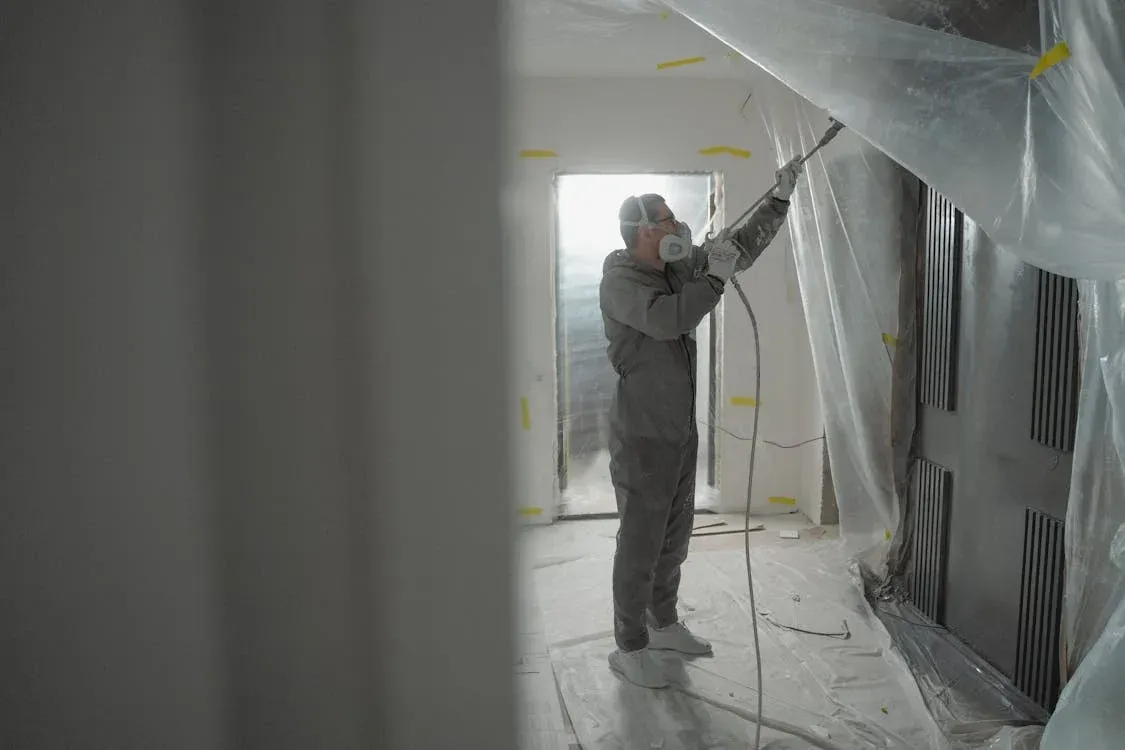Here’s what you need to know before buying a fixer upper

When Breanna Reish decided to buy a home, she didn’t have a lot of extra cash on hand so she looked at foreclosures. She found an older home that had been virtually stripped to the bone, but that didn’t deter her.
“You name it, (the previous owners) took it,” says Reish, owner and financial planner of Wealth of Confidence in Riverside, California, who bought her home in 2009. “We were left with a shell of a home that needed a ton of work, but we were able to lower the asking price down $27,000 and the bank also put in $18,000 worth of repairs in order for us to qualify for a loan.”
Reish wanted to do most of the work herself, but some of the projects (like new hardwood floors) were hired out to professionals. Although it took extra time and sweat equity, Reish says she’s happy with her fixer upper.
“We paid so little compared to what we would pay to live anywhere else,” she says, adding that the home has since appreciated in value — an added bonus.
Buying and renovating an existing, older home that needs substantial work isn’t for the faint of heart. A fixer upper can come with a host of obstacles, both financial and logistical, but the rewards can outweigh those challenges.
Here are some considerations and tips for buying a fixer upper so you know what to expect.
GET INTO THE RIGHT MINDSET
When figuring out how to buy a fixer upper, it’s crucial that you have a plan going into it. It can take a considerable amount of time and money to renovate a home, which could extend your timeline and blow up your budget if you’re not careful.
Donovan Reynolds, a licensed real estate agent with Coldwell Banker in Atlanta, suggests budgeting an extra 20 percent into your homebuying budget for a fixer upper, just in case.
Mina Starsiak Hawk, half of the mother-daughter duo on HGTV’s home renovation show, Good Bones, agrees.
“Even in the best-case scenarios there can be factors out of your control, like delays in city permits or repairs that come to a halt because of weather conditions,” Hawk says. “So when looking at fixer uppers, approach it like there will be problems down the line.”
If you plan to do many of the repairs and renovations yourself, you still might need to hire a professional at some point. There may be projects that are beyond your skill set, like electrical and plumbing work, so you’ll want to incorporate that into your budget as well.
EXPECT YOUR LIFE TO BE DISRUPTED
Aside from the timeline and budget, consider your lifestyle. Do you intend to live in the home while it’s being renovated, or do you want something that’s move-in ready? If you work from home or have young children, for example, living in a home that’s under construction for several months might be a deal-breaker.
“Like the saying goes, the true test of any relationship is if you can live in a renovation together because there are lots of things to consider like your usual habits and standards of living,” says Karen E. Laine, Hawk’s mother and co-host on their HGTV show. “Think carefully about whether you can live without things like a bathroom or a fully functioning kitchen when you’re fixing up your home.”
If living through the hum of chainsaws and bangs of hammers isn’t appealing, you can spread out the remodeling projects over time to minimize the disruption.
FOCUS ON LOCATION
Location, location, location. It’s the oft-repeated mantra in real estate, and for good reason. You can always fix up a home, but you can’t change its location. An ideal fixer upper is in a desirable neighborhood that you love. Same goes for future buyers if and when you sell.
You might be able to score a great deal on an older, dilapidated home, but if you end up hating your surroundings or property values are struggling in the area, you might be left with buyer’s remorse.
“Seek the help of an experienced (real estate agent) to help you understand the neighborhood,” Reynolds says. Putting the work into a shabbier home in a sought-after neighborhood, he adds, means you get to “live in an area you might otherwise not have been able to afford.”
When shopping for a fixer-upper home, look at neighborhood amenities, such as local schools, shopping, dining, parks and crime statistics. Are the surrounding homes well maintained? Is the fixer upper located on a busy intersection or close to places like a railway or a landfill?
Reynolds also suggests paying attention to whether the renovations you plan on making will make sense for the area.
“Pay attention to the after renovation value (ARV) so you can estimate whether or not these improvements will give you a return on your investment,” he says.
In other words, your home may increase in value, but you may not be able to recoup what you put into repairs. An experienced real estate agent can help you determine the ARV by comparing properties in the local area to estimate the value after the repairs you want to make.
GET THE RIGHT TYPE OF INSPECTION
Laine, Reynolds and Hawk all agree that when you’re ready to put in an offer, it’s a wise move to bring along a trusted home inspector or contractor. That’s because these professionals may be able to point out potential flaws or other critical issues that could present problems later on.
“You want to have someone look at things like the overall structure of the home, crawlspaces, insulation and especially the foundation,” Hawk says. “If the property doesn’t have a good foundation, it may not be the right one for you because it can end up being a money pit.”
It’s also important to not let cosmetic flaws deter you from a home you love. Things like broken windows, paint, fixtures and trim, to name a few, can be easily fixed. Instead, focus on the major components of a home so you can anticipate how much you might need to budget and how long it might take to make repairs, such as:
- Electrical, plumbing and sewer systems
- Air conditioning and heating (HVAC) systems
- Roofing
- Driveway, decks or steps
- Extensive work needed on bathrooms and kitchen
- Foundation
Before closing on a fixer upper, consider a specialized home inspection for a detailed report on the house. Here’s what to consider getting done, in addition to a standard home inspection:
- Pest inspection: You never know if a home is damaged from pests like termites, ants or beetles, as it can cause major headaches down the line.
- Sewer lines: Getting a sewer line scope and septic tank inspection can help you figure out if they’re in need of repair or replacement, especially on older properties.
- Thermal imaging: A home inspector uses infrared light technology to identify potential issues that may not be apparent to the naked eye. This includes heat loss and air leakage, insufficient insulation, moisture damage and abnormal electrical components.
There are additional services your home inspector might offer, so speak with a reputable professional to see if you may need more specialized inspections.
FIND THE RIGHT FINANCING
Remodeling a fixer upper can get pricey, so it’s critical you have the right financing lined up. Some home renovation mortgages even allow you to roll remodeling costs into your loan amount with a single mortgage. Here’s an overview of some of those programs:
Fannie Mae’s HomeStyle Loan
The HomeStyle Renovation loan is a conventional mortgage that allows borrowers to either buy a place that needs repairs or refinance their existing home loan to pay for improvements. A certified contractor must prepare and submit a cost estimate and detailed scope of work. The money for the projects goes into a separate escrow account that’s used to pay contractors directly, so you won’t have direct access to the money.
Freddie Mac’s CHOICERenovation Mortgage
This renovation mortgage, guaranteed by Freddie Mac, is another conventional loan option to roll remodeling costs into a single-close mortgage. The loan can also be used to renovate or repair a home that’s been damaged by a natural disaster or to prevent future damage from a disaster.
VA renovation loan
The U.S. Department of Veterans of Affairs guarantees loans for military borrowers and their spouses. Borrowers can use a VA loan to purchase a home in need of repairs and improvements, and combine the cost of those projects into their loan amount. Borrowers must use a VA-approved contractor, and lenders may charge a construction fee.
FHA 203(k) loans
The Federal Housing Administration Section 203(k) renovation loan helps homebuyers purchase a home — and renovate it — with one mortgage. FHA loans also have lower credit score and down payment requirements than conventional mortgages. Homeowners can also use the FHA 203(k) loan program to refinance their existing loan and add the cost of renovation projects into the new one.
Other options to fund home renovations include taking out a home equity loan or line of credit or a personal loan. An experienced mortgage lender can help you narrow down your choices and decide on the best type of financing for your needs and real estate goals.
BOTTOM LINE
There is no such thing as the perfect fixer upper. It’s a matter of a fixer upper that’s perfect for you. Each property is different and the choice depends on your budget, timeline and lifestyle preferences. Be realistic about whether you want to take on a major project or one that requires a few fixes here and there before taking the leap.
Written by Sarah Li Cain on AUGUST 21, 2019 on BankRate.com.














